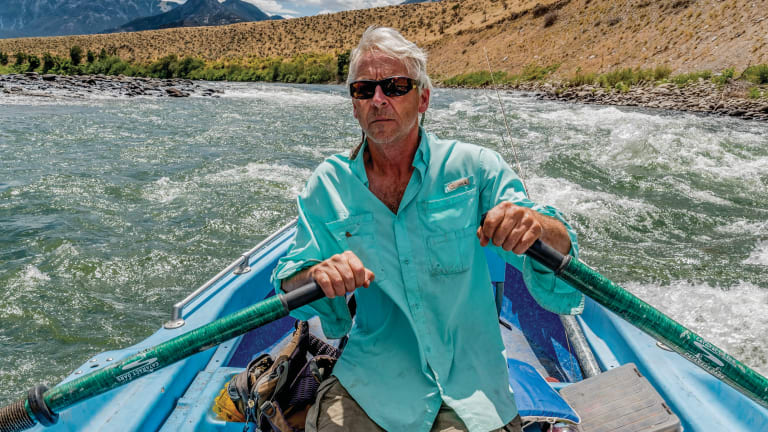As we shoved off, I sensed only that launching the drift boat, or any boat for that matter, had been a hasty call, one that was unimpeachably mine. Rock Creek several Junes ago was treacherously high. It was also the first time I saw Dan Lahren row a drift boat. Having guided since the 1970s on burly Western rivers, Lahren was the right companion to have aboard.
For all but the least sensible, Rock Creek is raft water in June; we had chosen the drifter, though, because our fishing partner and mutual friend Jim Harrison had grown too old and unstable to fish out of a rubber boat. At peak runoff, with its boulder gardens covered by stained water, a Western freestone like Rock Creek in southwest Montana can appear deceptively innocuous and, with its relative absence of obstacles, can lull even a seasoned guide into a mistaken sense of confidence.
I took the oars initially, and the Clacka felt shot from a sling. Despite my heaving, the quaking alders and willows blurred by. The oarlocks nearly smoked. Kicked loose from the banks by rising water — the result of a thunderstorm in the headwaters, the severity of which we had underestimated — sediment and in-stream particulate ticked against the fiberglass bottom. Holding lies passed by like apparitions. From the bow seat, aiming well downstream, Harrison made a sharp cast with a weighted streamer, which landed, due to our warping speed, even with the port oar. On a straightaway, I looked back at Lahren and shook my head. Without my suggesting it, he had assembled the spare oar and pinned it, at the ready, under his thigh.
“Go another bend or two, and I’ll spell you,” he said. He spit a stream of Skoal over the gunwale. “I’d smoke, but the boat’s going too fast to light a cigarette.”
It took 15 minutes to reach a spot where we could eddy-out. Brown trout, fattened on aquatic worms and stonefly nymphs, were stationed nose-to-tail, it seemed, in a line of bubbles trailing off a grassy island. Harrison, the acclaimed writer best known for his prose and poetry rife with an eloquent and “ravenous love of Earth,” teased a parakeet-yellow streamer through the soft water and managed to catch a few beauties, but we regarded them as mere distractions. Our focus was on the beast that is Rock Creek in runoff. Even in average flows, the water’s steep pitch and middleweight musculature make for arduous rowing; on a day like this one, when deadfalls kicked loose from logjams can form new strainers or render impassable channels that just yesterday were clear, the river, inaptly named a creek, can take a boat in its teeth and refuse to let go. If you get sloppy or make a mistake, it will bite you.
We pushed off, and Lahren took the oars through a stretch of river called the Microburst, where decades ago on the tight-hugging hillsides a sudden and violent downdraft instantly felled a thousand ponderosas. Without missing a stroke, he slipped us impeccably through two tight S-turns; ran us cork-light through a tossy wave train; and, sculling masterfully, fought off a couple of grabby hydraulics. From the stern, I watched him scan the hazards ahead of us; he stayed four strokes in front of the river’s pending threats. When it came time to swap roles again, I asked him how he became so adept at rowing.
“Got good quick,” he deadpanned, “because I don’t know how to swim.”












































































































































































No comments:
Post a Comment